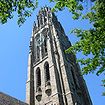- Directed Studies at Yale University
-
Directed Studies at Yale University is a selective humanities study program for freshmen. It follows the Great Books of the Western tradition, and resembles Princeton University's Interdisciplinary Approaches to Western Culture, Columbia University's Core Curriculum, The University of Notre Dame's Program of Liberal Studies, Georgetown University's Liberal Arts Seminar, the University of Chicago's Core Curriculum, the Program in Structured Liberal Education at Stanford, the Kaplan Humanities Scholars Program at Northwestern University and the program of study at St. John's College.
Directed Studies consists of three year-long courses: Literature, Philosophy, and Historical and Political Thought (formerly "History and Politics") Previously, Art History and Classics were also available as options. Each class meets once as a lecture and twice in section each week. Lectures are given to the entire Directed Studies program, while sections range from 16-18 students. Section professors range from postdoctoral fellows to tenured faculty. Lectures have been given by prominent scholars such as Sterling Professors R. Howard Bloch and Harold Bloom. Several participants have returned to Yale as scholars, including David Possen, Justin Zaremby, Margaret Litvin, cognitive scientist and philosopher Tamar Gendler, English professor S. Shameem Black and political scientist Roy Tsao.
Students begin reading ancient Greek works, and end the year in the 20th century. In the 2009-2010 school year, the literature syllabus included Homer, Greek lyric poets, Catullus, Horace, Sophocles, Aeschylus, Euripides, Virgil, selections from the Bible, and Dante in the fall. In the spring, students began with troubadour poets, then read Petrarch, Cervantes, Shakespeare, John Milton, Wordsworth, Goethe, Flaubert, Tolstoy, Proust, Eliot, and Stevens[disambiguation needed
 ].
].Philosophy classes read Plato, Aristotle, Lucretius, Sextus Empiricus, Augustine, Anselm, and Thomas Aquinas. In the spring, they continued with Descartes, Leibniz, George Berkeley, David Hume, Kant, John Stuart Mill, Kierkegaard, Nietzsche, and Nelson Goodman.
History and Politics classes covered Herodotus, Thucydides, Livy, Polybius, Tacitus, Plato, Aristotle, Augustine, and Aquinas in the first semester. Second semester work included Machiavelli, Thomas Hobbes, John Locke, Rousseau, Adam Smith, Kant, Edmund Burke, Alexander Hamilton, James Madison, Tocqueville, Marx, Nietzsche, and Arendt.[1] Syllabus.
The program includes 125 students a year, or about one-tenth of each freshman class. About 50 are admitted because they expressed interest in their applications to Yale College. The remaining 75 must apply for the program during the summer before freshman year.[1] A selected few may also be offered a place in the program before summer depending on their academic record and intellectual interests.
There is some criticism of Directed Studies on campus. Some—including students who leave the program after the first semester—say so much material cannot be covered in sufficient intellectual depth in one year. Others say that the workload is too intense, and that students in the program do not have enough opportunity to pursue other interests. Still others say that the program limits its participants' future academic possibilities too much. However, most Directed Studies alumni—the majority of whom major in a humanities discipline, but many of whom go on to the sciences—defend the program passionately.
A final criticism of the program is that its reading list includes too many dead white males. In past years, the syllabus has included short stories by Eudora Welty and Flannery O'Connor and novels by Jane Austen and Virginia Woolf, but in 2008, Sappho and Hannah Arendt were the only female authors included in the syllabus.
References
- ^ a b "Yale Directed Studies". http://www.yale.edu/directedstudies. Retrieved 2010-05-04.
Yale University Schools Yale College · Graduate School of Arts & Sciences · School of Architecture · School of Art · Divinity School · School of Drama · School of Engineering & Applied Science · School of Forestry & Environmental Studies · Law School · School of Management · School of Medicine · School of Music · School of Nursing · School of Public Health · Institute of Sacred Music · Defunct: Sheffield Scientific SchoolResidential Colleges Museums and Research Centers Yale University Art Gallery · Yale Center for British Art · Peabody Museum of Natural History · Yale University Collection of Musical Instruments · Lewis Walpole Library · Paul Mellon Centre for Studies in British Art · Defunct: Yale Initiative for the Interdisciplinary Study of AntisemitismSee also Categories:- Yale University
- Specific University Curricula
Wikimedia Foundation. 2010.

